 Petzlover
Petzlover Beagle is originated from United Kingdom but Giant Schnauzer is originated from Germany. Beagle may grow 29 cm / 11 inches shorter than Giant Schnauzer. Beagle may weigh 37 kg / 81 pounds lesser than Giant Schnauzer. Beagle may live 4 years more than Giant Schnauzer. Beagle may have more litter size than Giant Schnauzer. Beagle requires Low Maintenance. But Giant Schnauzer requires Moderate Maintenance
Beagle is originated from United Kingdom but Giant Schnauzer is originated from Germany. Beagle may grow 29 cm / 11 inches shorter than Giant Schnauzer. Beagle may weigh 37 kg / 81 pounds lesser than Giant Schnauzer. Beagle may live 4 years more than Giant Schnauzer. Beagle may have more litter size than Giant Schnauzer. Beagle requires Low Maintenance. But Giant Schnauzer requires Moderate Maintenance
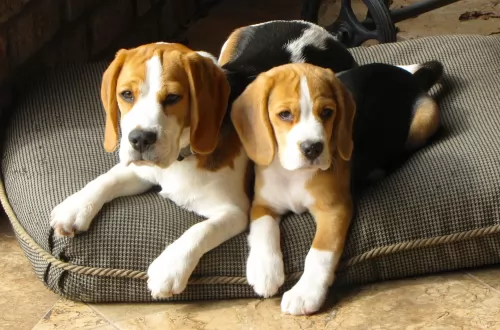 There are some accounts of similar size dogs used for hunting in Greece in 5th century BCE. During 8th century the Talbot Hound breed was created. In 11th century Talbot Hound was brought to England by William the Conqueror. While using in hunting they are found to be a slow runner. To overcome the situation and increase their running speed the hunting people bred Talbot Hound with Grey hounds. The beagles described earlier were very small in size and are said as pocket beagles.
There are some accounts of similar size dogs used for hunting in Greece in 5th century BCE. During 8th century the Talbot Hound breed was created. In 11th century Talbot Hound was brought to England by William the Conqueror. While using in hunting they are found to be a slow runner. To overcome the situation and increase their running speed the hunting people bred Talbot Hound with Grey hounds. The beagles described earlier were very small in size and are said as pocket beagles.
 As a working dog breed, the Giant Schnauzer, known also as the Riesenschnauzer, hails from Germany.
As a working dog breed, the Giant Schnauzer, known also as the Riesenschnauzer, hails from Germany.
It is believed that the first Giant Schnauzers emerged in Bavaria in the 17th century already. It is the largest of the 3 Schnauzer dogs – Miniature, Standard and Giant. There are quite a few breeds which have been used in its development – Bouvier des Flandres, Great Dane and the German Pinscher among other.
The dog was bred to work on farms and also used as a military dog during the World Wars.
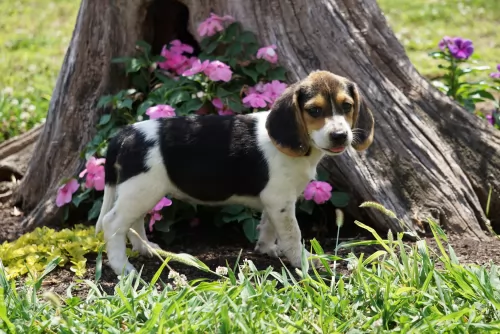 They are small and compact breed, and always happy and fun loving. They should be trained by patient and creative training techniques. Beagles are very much interested in using their nose in finding interesting scents and are food focussed. They always wake their neighbours at 6 am by their half howling. They think everyone is their best friend and love to have friendship with other animals and humans. They have about 220 million scent receptors and are said as "a nose with feet" by humorist Dave Barry.
They are small and compact breed, and always happy and fun loving. They should be trained by patient and creative training techniques. Beagles are very much interested in using their nose in finding interesting scents and are food focussed. They always wake their neighbours at 6 am by their half howling. They think everyone is their best friend and love to have friendship with other animals and humans. They have about 220 million scent receptors and are said as "a nose with feet" by humorist Dave Barry.
We can see beagles at many airports in their duty. They can easily trace out the illegal things being smuggled. Since they are small in size they are suitable for apartment living. But they like to walk around several times. They should be exercised for plenty of time. Obedience training should be given to them by giving food reward. Beagles are wanderers of nature and so if possible they will try to escape. So it is necessary to make them microchipped or to wear a collar, to find them easily.
 With a thick, medium length double coat to protect him from the weather, the Giant Schnauzer’s coat is essentially wiry and hard and in solid black or in a greyish salt and pepper color.
With a thick, medium length double coat to protect him from the weather, the Giant Schnauzer’s coat is essentially wiry and hard and in solid black or in a greyish salt and pepper color.
The dogs have always traditionally had their ears and tails docked at the 2nd or 3rd joint to set them apart in looks, but these days both the ears and tail are left.
The tail is always held high. He has dark eyes. Like all Schnauzers, they have that distinct beard and eyebrows. The dog is large and well built and stands at 60 to 70cm in height and weighs anything between 25 and 48kg.
Intelligent, strong willed and energetic, the Giant Schnauzer is actually a quiet dog who doesn’t respond too well to strangers, being reserved around them.
He has a natural guarding and territorial instinct. When he is trained and socialized he makes a wonderful pet, responding well to a firm, consistent owner.
He loves his human family, and as a stable, reliable kind of dog, whether you’ve got children in the home, pets or elderly people, you can rely on your Giant Schnauzer to be a dependable, gentle pet at all the right times, being playful and energetic at other times.
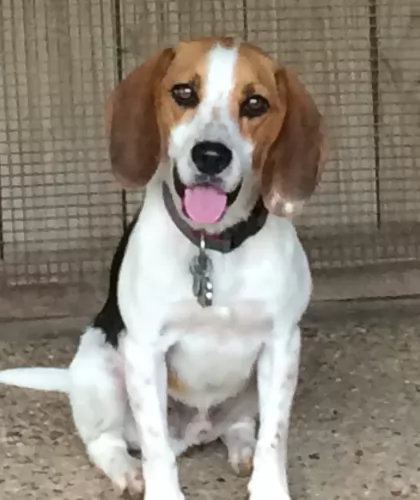 They are very good companion for children. They love to play and spend time with children.
They are very good companion for children. They love to play and spend time with children.
They have millions of scent receptors and so they can be seen in Airports and many important places in duty. Also they are interested in hunting small rodents.
They adapt well for apartment living but they don't like being alone for a long time. If kept alone for a long time in back yard they will begin to bark and dig pit or try to escape. Beagle likes hot weather more than cold weather.
Beagles are difficult to train up. Many people say it will take about one year to house train beagles. They have an attitude of "what's in it for me". But it depends on the personality and temperament of the individual.
 The Giant Schnauzer has many excellent characteristics which make it such a great pet. He is composed, alert, intelligent, loving and loyal to his human family.
The Giant Schnauzer has many excellent characteristics which make it such a great pet. He is composed, alert, intelligent, loving and loyal to his human family.
He is also playful, being happiest when roped into everything going on in the family. He has a solid, balanced nature, is robust and hypoallergenic.
He is powerful and needs a good dose of exercise and will love to join you on your cycle- and hiking trips. Good with children and pets in the home, this is a dog breed that will make a splendid, reliable pet.
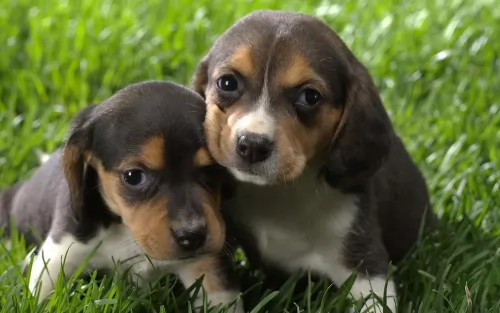 Beagle's ears should be checked occasionally for any sign of infections like discoloured wax, dirt or foul odour. Also their nails should be trimmed regularly. They should be exercised regularly in order to maintain a proper weight. The most common health problems in beagles are obesity, epilepsy and allergies.
Beagle's ears should be checked occasionally for any sign of infections like discoloured wax, dirt or foul odour. Also their nails should be trimmed regularly. They should be exercised regularly in order to maintain a proper weight. The most common health problems in beagles are obesity, epilepsy and allergies.
They are average shedders and having short hair thus it is easy to groom. They should be made to bath with a mild and non irritant shampoo.
 A healthy Schnauzer can reach 10 – 12 years of age, but even so, they are a dog breed prone to high rates of hip- and elbow dysplasia, hereditary eye disease and thyroid disease.
A healthy Schnauzer can reach 10 – 12 years of age, but even so, they are a dog breed prone to high rates of hip- and elbow dysplasia, hereditary eye disease and thyroid disease.
Blood-clotting diseases and epilepsy are also concerns with Giant Schnauzers as well as bloat. As with all deep-chested breeds, Giant Schnauzers are more at risk with this gastrointestinal syndrome known as bloat and which can be life threatening.
It is your right to ask the breeder about the medical history of your puppy’s parents.
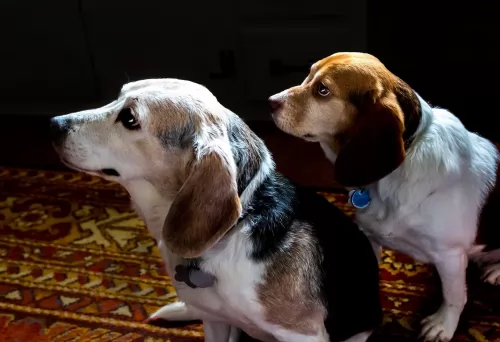 After 4 weeks of birth the puppy can be given solid foods by slowly increasing the ratio for many weeks. The recommended food is fresh meat of chicken breast, lamb, turkey and lean hamburger. The vegetables can be given as raw or steamed. The vegetables that will be good for them are raw baby carrots, broccoli, cauliflower and sweet peas. The puppies should be fed 3 to 4 small meals per day as they require more nutrients for their growth.
After 4 weeks of birth the puppy can be given solid foods by slowly increasing the ratio for many weeks. The recommended food is fresh meat of chicken breast, lamb, turkey and lean hamburger. The vegetables can be given as raw or steamed. The vegetables that will be good for them are raw baby carrots, broccoli, cauliflower and sweet peas. The puppies should be fed 3 to 4 small meals per day as they require more nutrients for their growth.
The grown up dog should be fed with the same food and 1 complete meal is enough for them. The meal should be given at noon. The food should be given based on calories as they should not get overweight. In addition to food, fruits such as blueberries, raspberries, banana and mango can also be given to them periodically.
Beagles should be exercised daily in order to maintain proper weight. Beagles are average shedders and having short hair which is easy to groom. They should be made to bath periodically with a mild shampoo.
Moderate exercise such as walking and cardio exercise such as chasing a ball should be given to them for staying them to be active and for maintaining good health.
 He is a particularly low shedding dog and so brushing him twice a week will suffice. He loves the closeness with his human family during these grooming sessions.
He is a particularly low shedding dog and so brushing him twice a week will suffice. He loves the closeness with his human family during these grooming sessions.
If you don’t know how to groom yourself, the Giant Schnauzers coat will require hand-stripping or clipping. If you want to keep your dog with that typical Schnauzer look, a visit to a professional groomer will be required as they will also tidy the hair around each paw as well.
Now that the ears are no longer cropped, he has fairly short floppy ears and it will be necessary to ensure that dampness, ear wax and dirt don’t build up to cause ear infections.
The teeth must also be brushed 2 or 3 times a week otherwise plaque buildup can cause dental disease as well as lead to other more serious diseases such as kidney- and heart disease.
If you’re a new dog owner, it can be hard to know which dog food to buy and which ingredients to look out for. Nutrition is of vital importance, and bad ingredients can make your dog sick and shorten his life.
A mix of the best commercially manufactured kibble mixed with home-made food full of the right balance of vitamins and minerals will be important as well as including some raw meat into the diet.
If in any kind of doubt about how to feed a large, energetic dog breed like this Giant Schnauzer, speak to your vet.
As a big, energetic dog, the Giant Schnauzer needs to live on a property where there is a garden. He will be requiring some hectic exercise every day.